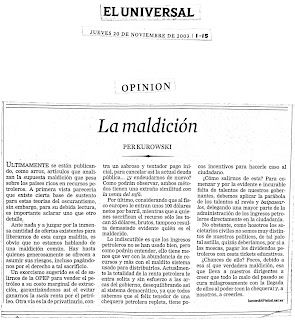In the name of that same transparency, let us also remember that for every $1 received by any oil-producing country (which forever sacrifices a nonrenewable asset), the public treasury of many oil-consuming countries receives, net, at least $4 and is therefore a likely victim of the same curse, albeit stricken by different symptoms. For instance, in many oil-consuming developed countries, the curse has now created such an addiction to petrol taxes that their whole fiscal structures would be completely unsustainable without them.
Transparency would also, perhaps, not be a bad rite to use to exorcise this tax man’s curse, since most of the gasoline consumers in these countries are not remotely aware of the real extent of the taxes and much less of how the proceeds are used.
For instance, having been told that these taxes were environmental, they would be surprised to learn that probably less than 0.5 per cent of the 100,000 million dollars collected yearly in Europe, just in taxes on lead-free gasoline, goes to the environment; and, worse, that much of it goes in subsidies to the even less environmentally friendly coal.
Also, today, as the possibilities of satisfying the world’s demands for energy seem quite uncertain and the world becomes more aware that the ultimate cost of cutting, or not cutting, the trees of the Amazon will be paid by all, whether they like it or not, it is clear that the world needs to become much more penny-wise when developing alternative energies; and we all know that the best and only companion of the penny-wisest is transparency.
So, after the pipelines, when do we start with the Exchequer’s bag?
The Financial Times


